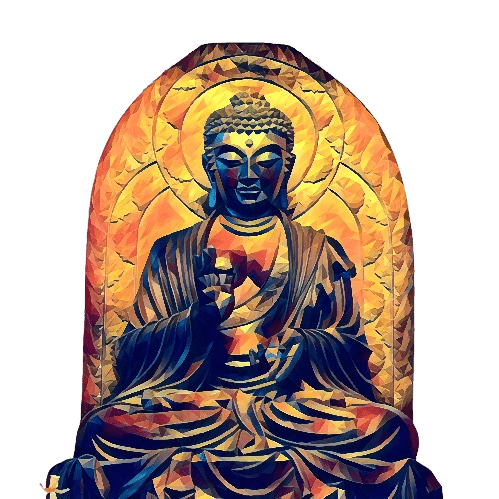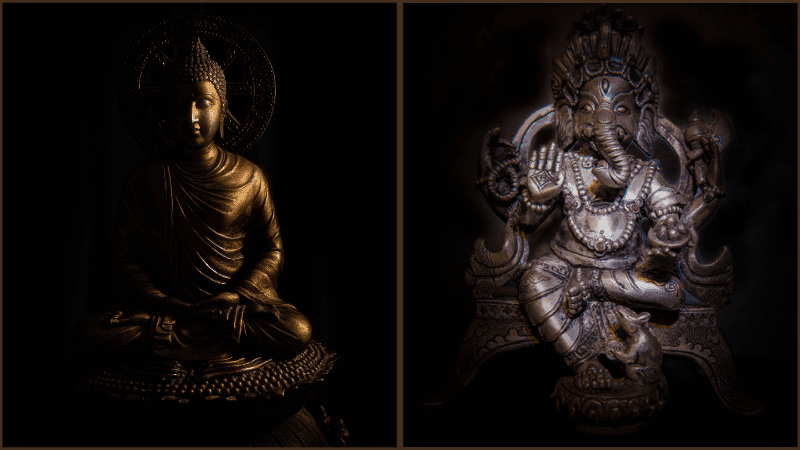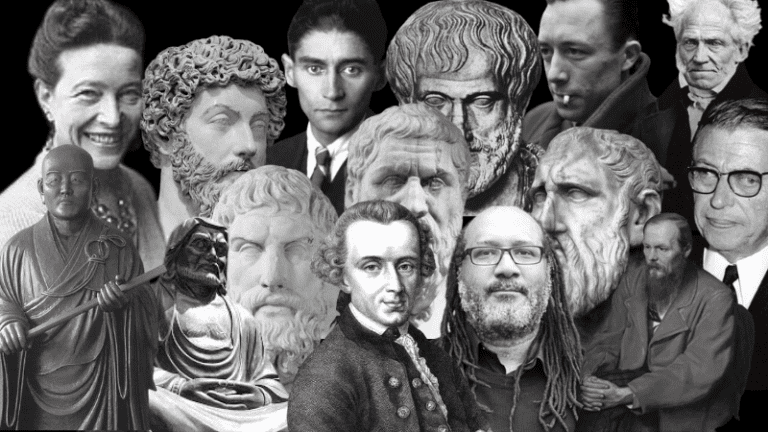Buddhism and Hinduism: A Comprehensive Comparison
If you are interested in Buddhism and Hinduism, you may be wondering which of the two is the right view for you (or simply which is more interesting to you). Both are incredibly complex religions/philosophies with a long history, and it can be difficult to discern the key differences and similarities between them. In this blog post, we'll look at the history of Buddhism and Hinduism, as well as their main beliefs and differences. We'll also provide you with some resources for further exploration.
The history of Buddhism and Hinduism
Buddhism and Hinduism are two of the oldest religions in the world. The Buddhism was founded over 2500 years ago founded by Siddhartha Gautama (also known as Buddha) in India. Hinduism is somewhat more difficult to define, as it has no single founder or central text. Hinduism has evolved slowly over time, with various Hindu scriptures written over the course of several centuries. But Hinduism is considered to be at least 3000 years old and is therefore the oldest major religion.
The origins of Hinduism lie in the Vedic culture of ancient India. The Vedas are a collection of sacred texts containing hymns, prayers and rituals for the worship of the Hindu gods. These texts were first written around 1500 BC and continued to be written until about 500 BC. Over time, the Vedic religion evolved into what we know today as Hinduism.
Initially, Buddhism was only a reform movement within Hinduism. Siddhartha Gautama was born into a wealthy Hindu family and grew up with the Vedic scriptures. However, the Hindu caste system and the hypocrisy of Hindu priests disappointed him. So he set out to find the truth about life and death. After six years of searching, he finally attained enlightenment while meditating under a tree. After that, he spent the rest of his life teaching others what he had learned.
Eventually, Buddhism became a religion in its own right. Buddhism spread throughout India and then to other parts of Asia, becoming one of the largest religions in the world.
Today counts the Buddhism worldwide about 500 million followers, during the Hinduism about one billion followers has.
Both are practiced all over the world, but they are mainly spread in certain areas. Buddhism is prevalent in countries such as Sri Lanka, Thailand, Cambodia, Laos, Burma, and Japan. Hinduism is mainly practiced in India, Nepal and Bali (Indonesia). There are also large Hindu populations in Mauritius, Guyana, Trinidad and Tobago, Fiji, and Suriname.
The most important beliefs of Buddhism and Hinduism
Buddhism and Hinduism share many beliefs, including the belief in karma (the idea that our actions have good and bad consequences), reincarnation (the belief that we are reborn after death), and the importance of meditation.
Let's take a closer look at these (and other important beliefs):
The main beliefs of Hinduism are:
- The belief in karma (the law of cause and effect): Chances are good that you have heard and even used the term "karma" in your everyday language. But chances are also good that you know the exact meaning: "the force created by a person's actions that determines the shape of his or her destiny." Or, as the Hindus would say, "The word comes from the Sanskrit word karman and refers to the spiritual principle of cause and effect, which states that our intentions and actions have certain effects in our lives, whether in the present or in the future. Good intentions and good deeds lead to good karma and future happiness, while bad intentions and bad deeds lead to bad karma and future suffering.
- Reincarnation: The belief that our soul is reborn in another body after our death. This process takes place until we reach nirvana (which means "extinction" in Sanskrit), a state of perfect bliss. In order to be reborn in a better life, we must live a good life and accumulate good karma.
- The caste system: It consists of four main social classes: Brahmins, Kshatriyas, Vaishyas and Shudras - who can be described as priests, rulers, farmers/traders and workers respectively.
- The concept of Dharma: to live in accordance with one's caste and fulfill one's duties in life.
- The importance of rituals and ceremonies, such as the fire sacrifice ceremony, a ritual in which an offering is made to the gods by burning it on a fire.
- The worship of Hindu gods and goddesses: There are numerous Hindu gods and goddesses, such as Brahma (the creator god), Vishnu (the sustainer god), Shiva (the destroyer god), Lakshmi (the goddess of wealth), Saraswati (the goddess of knowledge), and Devi (the supreme goddess).
- Sacred Texts: Hindus believe in the Vedas, a collection of ancient texts written between 1500-500 BC. The Vedas are divided into four parts: the Rig Veda (the oldest and most important), the Sama Veda, the Yajur Veda and the Atharva Veda.
The main beliefs of Buddhism include:
- The four noble truths: the truth about suffering, the truth about the origin of suffering, the truth about the cessation of suffering, and the truth about the way to cessation of suffering.
- The concept of karma: Buddhism shares the Hindu belief in karma, but they have a different interpretation of it. For the Buddha, karma is not an external force, but the consequences of our actions.
- Reincarnation: Buddhism also believes in reincarnation, but they do not believe in a soul being reborn. Instead, they see it as a continuous cycle of life, death and rebirth.
- Nirvana: The goal of Buddhism is to achieve Nirvana, a state of perfect peace and bliss.
- The Middle Way: The Middle Way is the path that Buddhism recommends to us, namely the path of moderation. This means avoiding the two extremes of self-love and self-denial.
- The Eightfold Path: The Eightfold Path is the path that leads to nirvana. It consists of eight steps: right understanding, right thinking, right speech, right action, right livelihood, right effort, right mindfulness, and right concentration.
- Buddhism also teaches that there is no permanent self or soul and that attachment to things is the cause of suffering.
Do you want to know who and how Gautama Buddha really was? We have a detailed article for you.
The main differences between Buddhism and Hinduism
However, there are some important differences in their beliefs. Buddhism teaches that we can escape the cycle of rebirth and reach nirvana (a state of perfect peace and enlightenment) through our own efforts. Hinduism, on the other hand, teaches that we are reborn in different forms depending on our karma and that we need the help of a guru (spiritual teacher) to achieve liberation from this cycle.
Buddhism and Hinduism also differ in their beliefs about the nature of reality. Buddhism teaches that everything is impermanent and suffering is an integral part of life. Hinduism, on the other hand, teaches that reality is eternal and that our soul is a part of Brahman (the ultimate reality).
Buddhism also has a different concept of the self. Buddhism teaches that there is no permanent self or soul and that we are all connected. Hinduism, on the other hand, teaches that each person has a soul (atman) that is a part of Brahman.
Another major difference is the gods that each religion worships. Buddhism is non-theistic, meaning it does not believe in a personal God. Hinduism, on the other hand, is polytheistic and has many gods and goddesses.
The most famous gods of Hinduism are Vishnu (the preserver), Shiva (the destroyer) and Brahma (the creator).
Buddhism does not believe in any of these gods. This is the main reason why it is easy to combine Buddhism with other religions, but difficult to combine Hinduism with other religions.
In fact, Buddhism has gained such a large following in China, Vietnam, and Japan because it has been able to coexist with the indigenous religions of those countries.
Japan's indigenous religion, Shinto, is probably the most prominent example of this coexistence.
Hinduism, on the other hand, was often seen as a threat to the indigenous religions of these countries and was persecuted as a result.
The main similarities between Buddhism and Hinduism
Despite their differences, Buddhism and Hinduism also have many things in common.
Buddhism and Hinduism share many beliefs, including the belief in karma (the idea that our actions have good and bad consequences), reincarnation (the belief that we are reborn after death), and the importance of meditation. This love of nature is likely due to the fact that both Buddhism and Hinduism originated in India, a country with a long history of environmentalism.
They also share a belief in compassion and ahimsa (non-violence), which is why both Buddhism and Hinduism are traditionally pacifist religions.
In addition, both religions emphasize the importance of moral behavior, honesty, and self-control.
Which religion is right for you?
There is no simple answer to this question and in our opinion you should find it for yourself. And that's why we don't want to say anything specific.
Even more so because we usually focus on the philosophical aspects of Buddhism and Hinduism and do not practice any of them as a religion.
Buddhism and Hinduism are both complex religions with a long history. If you want to learn more about Buddhism and Hinduism, we recommend that you contact the institutions of both religions and check out the resources below.
However, Buddhism can coexist with other religions and that is why many people say that it is easier to practice than Hinduism. In this respect, you could say that it is the better choice for you.
If you're looking for more "snack-sized" articles that often focus on practical aspects for daily life, we have a lot of content for you. Here's a quick overview:
How to learn more about each religion
There is information about Hinduism and Buddhism on every medium you can imagine.
Whether you prefer to read books, magazines, or articles, listen to audio books, or watch videos on the Internet, you can find a lot of helpful information about both religions.
Here are some books you might want to read:
- The Buddhism Guide: A Simple Introduction to Buddhist Teachings, History, and Practice by Jay Garfield.
- Hinduism for Beginners: A Comprehensive Introduction to the World's Oldest Religion by Swami Bhaskarananda
- Buddhism: A Very Short Introduction by Damien Keown
- Hinduism: A Very Short Introduction by Kim Knott
- The Heart of Buddhism: The Practice of the Four Noble Truths by Thanissaro Bhikkhu
- Buddhism Without Beliefs: A Contemporary Guide to Awakening by Stephen Batchelor
- The Essential Teachings of Ramana Maharshi: A Westerner's Guide to the Heart of Hinduism by David Godman
- Buddhism: An Introduction and Guide (Penguin Classics) by Christmas Humphreys.
- In the Words of the Buddha: An Anthology of Discourses from the Pali Canon by Bhikkhu Bodhi.
That's it. We hope you enjoyed this article about Buddhism and Hinduism. If you have any questions or comments, please let us know. Thanks for reading!

Who and how Buddha really was you can learn here







